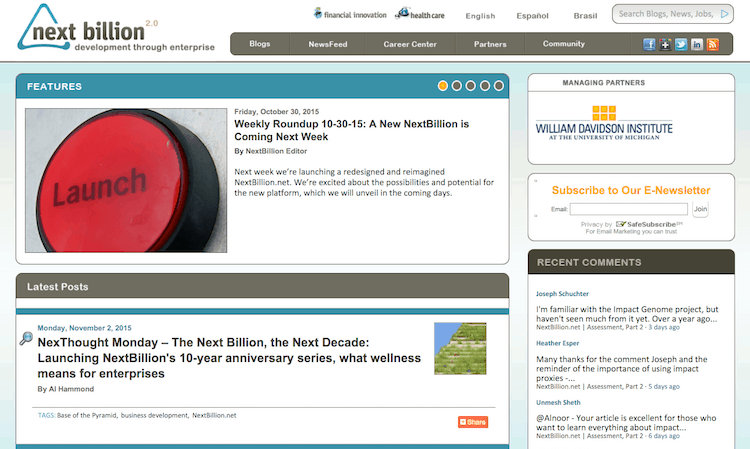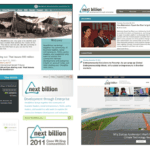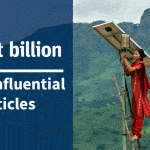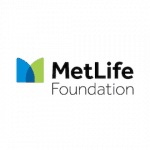Announcing the New(ish) NextBillion: How – and Why – We’ve Updated the Site
Like most sites, NextBillion is continually looking for ways to make our site design more attractive and usable for readers. Remember back before we launched our current design in 2016, when the site used to look like this?

Today we’re announcing several small but important changes: They’re not quite as dramatic as the comprehensive redesign we made a few years ago, but they’re significant nonetheless.
We hope these changes will make the platform more intuitive for readers to navigate – and easier for guest writers, potential partners and others to utilize.
Change of Times, Change of Terms
NextBillion was launched in the heyday of the “blogosphere,” when the global development sector was beginning to embrace the blog format. The site’s early content was written very much in a “bloggy” style: Posts were short, sometimes just a paragraph or two, and were often very informally written.
Well, times (and the Internet) have changed, and so has our approach. Our articles have grown longer, more detailed, more formal – and decidedly less bloggy. We’ll now refer to them as “articles” – a change in terminology that will be seen throughout the site. And though our sweet spot for articles will remain around 800 – 1,200 words, we’ll be open to slightly longer pieces going forward.
A new approach to fostering conversation
One of NextBillion’s key goals has always been to encourage open conversation around the core issues facing the development through enterprise community. That’s still our goal, and we view it as an essential ongoing function of our platform.
But just as the global development blogosphere has wound down, so has the “comment culture” that once existed on sites like ours. These days, on NextBillion and many sites in the social impact sector, it’s rare to see a substantive comment – and even rarer to see a stimulating, on-topic conversation. Most of this back-and-forth has migrated to social media, and formerly active comments sections are now mostly magnets for spam.
In response, we’re removing the commenting feature from posts. In its place, we’ll institute a new approach to channelling any conversation that’s sparked by our content: We’ll encourage more “point/counterpoint” response posts instead. So, if you see an article on NextBillion that moves you to respond, you’re welcome to reach out to our editors to explore a possible response post. As we’ve seen, this approach can lead to illuminating debate: If this sort of conversation emerges, we’ll capture and feature it as a mini-series on the site.
More focus on series
Speaking of series, we’ll increase our focus on this approach to organizing content. We’ll continue to publish ongoing, year-long series each year, zeroing in on trending topics determined by our editors each January. (We welcome suggestions, so please don’t hesitate to send them.)
Alongside these long-term series, we’ll aggregate related posts into shorter, more focused series and point/counterpoint exchanges. And we’ll continue to offer partner organizations the opportunity to sponsor existing series, or propose series of their own.
Simplified Navigation
We’re moving away from the mildly confusing “Site” vs. “Sector” terminology we used in our prior navigation, which led to some of our content being located in both sites and overlapping sectors. Now, we’re phasing out our existing “Sites” (including NextBillion Financial Health and NextBillion Health Care) and organizing all finance and health-related content under the appropriate sector, represented in a drop-down menu at the top of the page. (The content from those two sites is still accessible on NextBillion, it’s just categorized under the relevant sector instead.)
Playing to our strengths
We’ve experimented with plenty of different formats over the years, including podcasts, video, “tweet compilations” and other variations on our standard articles.
But experience, and our reader survey, have shown us that readers seem to gravitate toward two main formats: Guest articles and written Q&As.
So we’ll be bringing these two article types into sharper focus via the “Articles” drop-down menu, where you can access either our guest articles, our written interviews, or all our original content.
Making it Easier to Work with NextBillion
We’ve revamped our explanations of how to utilize and partner with NextBillion, and made it easier for readers and potential guest writers/partners to learn how to pitch content for the site.
These pages can now be found under the “Contact” drop-down menu at the top of the page.
Our Commitment to Open Discussion
Despite all these changes, one thing that hasn’t changed is NextBillion’s commitment to providing a forum for open discussion of the opportunities and challenges of development through enterprise. As part of that commitment, we’re happy to buck the growing trend toward paywalls and sponsored content on sites serving the development sector.
We are grateful to our parent organization, the William Davidson Institute, for making that possible – their support allows us to offer a free discussion platform to anyone with important insights to share, and the expertise to back them up. But we understand the business imperatives that make many sites adopt paywalls and host sponsored content – and we share their interest in making our site sustainable.
So we’re also expanding and clarifying our unique approach to partnerships: Our goal is to create more space for potential partners to share their insights and build their positions as thought-leaders on NextBillion, in a way that aligns with our broader interest in promoting open discussion. Click here to learn more about our approach, and contact our editors if you’d like to talk about ways we might work together.
We hope these changes – though subtle – will amount to a substantial improvement in usability for everyone who reads or writes for the site. We’re looking forward to hearing your feedback – you’re welcome to contact us to share your thoughts.
Photo credit: Sergey Zolkin via Unsplash
- Categories
- Social Enterprise



